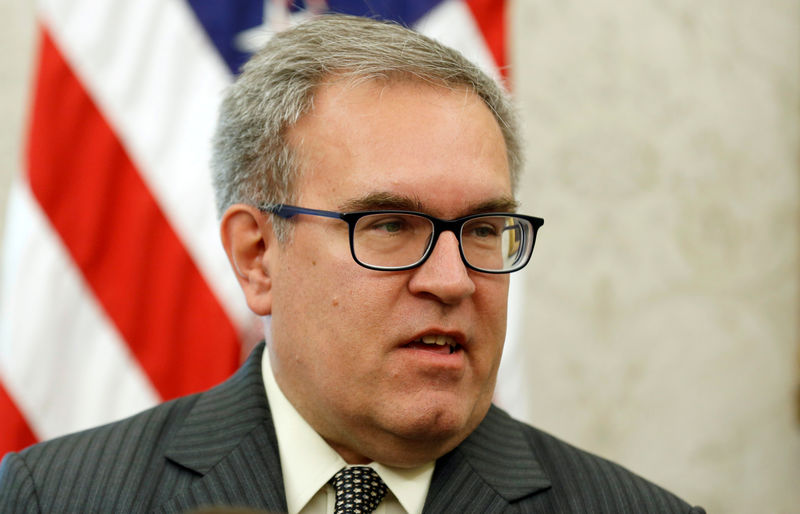By Humeyra Pamuk and Jarrett Renshaw
WASHINGTON/NEW YORK (Reuters) - EPA acting administrator Andrew Wheeler rejected a proposal from his staff that would have reduced the ambition of the nation’s biofuel policy over the next three years, arguing the targeted range it included for annual ethanol consumption was too low, according to two sources familiar with the matter.
The decision, made in December as part of the EPA's effort to reset targets set by Congress in 2007 closer to market reality, has become a source of concern among the oil industry’s Republican legislative backers, some of whom have threatened to withhold support for Wheeler's confirmation as permanent EPA head over his views on ethanol.
The issue represents the latest flashpoint in the ongoing clash between Big Oil and Big Corn over the nation's biofuel policy, which has complicated President Donald Trump’s relationship with the two rival constituencies that helped sweep him to the White House in 2016.
Under the U.S. Renewable Fuel Standard, oil refiners must blend billions of gallons of biofuels into their gasoline and diesel each year or buy credits from those that do.
The corn industry is constantly pushing for targets to go up to ensure a robust market for growers, while the oil industry wants them to decline because biofuels compete with petroleum and compliance costs them money.
Wheeler rejected a staff proposal presented in December that suggested the amount of ethanol that must be blended into the nation’s fuel could be cut from the current level of 15 billion gallons annually to as low as 14.3 billion over the final three years of the RFS program ending in 2022, a figure that had been sought by the oil industry, according to two of the sources.
EPA staff made the proposal in the form of a range of 14.3 billion to 15 billion, the two sources said.
Wheeler, who has been running the agency on an interim basis since his predecessor Scott Pruitt resigned in July, dismissed the proposal saying the 14.3 billion gallons at the bottom of the range was too low and would guarantee outrage from corn-state lawmakers, one of the sources briefed on the matter said.
A second source familiar with the matter said Wheeler had rejected the 14.3 billion number because it was not clear if agency staff had considered the potential impact of a soon-to-be published EPA proposal to lift a summer ban on sales of higher-ethanol blends of gasoline called E15, which could boost the market for the corn-based fuel.
Asked about the exchange, the EPA's assistant administrator for the Office of Air and Radiation, Bill Wehrum, last week said: "We’ve talked to Wheeler about what we should do in the reset but no final decisions have been made." He added the work on the reset continued.
EPA spokesman Michael Abboud said on Friday: "EPA is still developing options regarding a reset proposal, and no final decisions have been made.”
Five Republican senators from oil states, led by Ted Cruz of Texas, sent a letter to Wheeler dated Feb. 11 asking him about his biofuels policies, and saying their support for his confirmation could hinge on his responses.
Trump nominated Wheeler in January but he still faces a senate vote, likely to take place at the end of February.
Two sources told Reuters the senators were particularly concerned about Wheeler’s rejection of the initial staff proposal on biofuel volume targets.
Officials from the senators’ offices did not respond to requests for comment explaining their concerns.
WAIVERS, MEETINGS
The senators were also concerned that Wheeler had signaled in several recent meetings the agency could issue fewer exemptions to the nation’s biofuel laws to small refineries than under Pruitt, according to the sources.
Pruitt's expanded use of the waivers, which are intended for small refining operations under financial strain, angered farmers and their legislative backers by exempting some 2.25 billion gallons of ethanol from the U.S. mandates.
But it also saved the oil industry hundreds of millions of dollars by driving down the cost of compliance credits.
One justification Wheeler could use for providing fewer waivers is that the lower credit prices have reduced the financial burden on refiners. But in recent weeks, refiners like Valero Energy Corp (NYSE:VLO) and HollyFrontier have been buying more of them than usual, three brokers told Reuters, a sign that they expect a rebound.
In their letter to Wheeler, the senators asked him if he would continue providing waivers “fully in accordance with the statute and case law.”
The senators have also been worried by Wheeler's meetings with biofuel trade groups and corn-state senators, according to one of the sources briefed by the senators’ staff.
A Reuters analysis of Wheeler’s public schedule shows he has met regularly with representatives of both sides of the debate, but has held several more meetings with corn backers than refining industry supporters since taking over in July.
EPA spokesman Michael Abboud has said that Wheeler "is happy to meet with those who actually request meetings."

(This version of the story corrects title for EPA official Bill Wehrum to EPA assistant administrator for the Office of Air and Radiation in 10th paragraph)